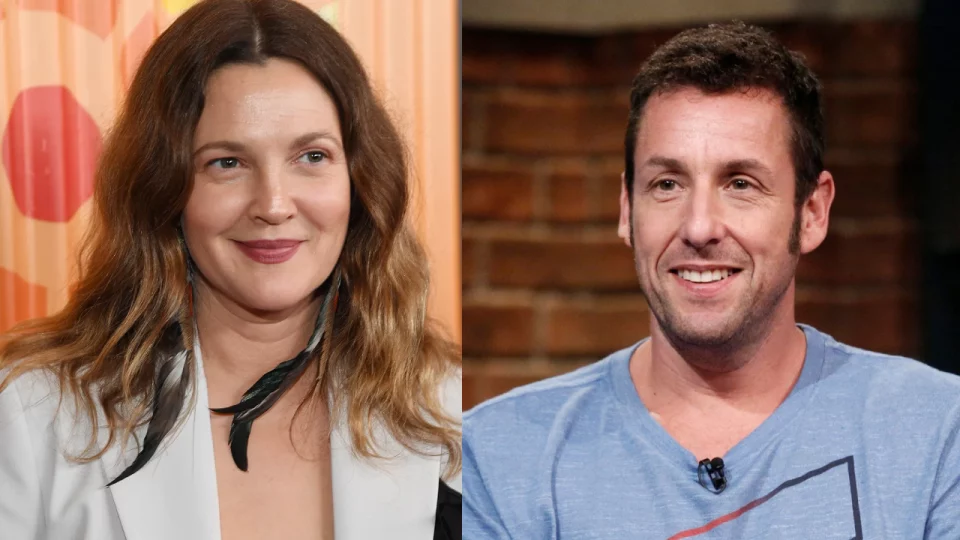In a charming twist that brings family, nostalgia, and Hollywood together, the daughters of Drew Barrymore and Adam Sandler recently experienced a slice of cinematic history that their parents starred in nearly two decades ago. While many children of actors might steer clear of their parents’ on-screen romances, Barrymore and Sandler’s daughters chose to embrace their parents’ unique connection by watching 50 First Dates, a beloved romantic comedy that many fans still hold dear.
This family movie night sparked a reflection on the enduring appeal of 50 First Dates, the career-defining bond between Barrymore and Sandler, and the power of classic romantic comedies to bridge generational gaps.
Table of Contents
A Movie Night with a Twist of Family History
In an episode of her daytime talk show, The Drew Barrymore Show, Barrymore revealed her pleasant surprise when she discovered her daughter and one of Sandler’s daughters watching 50 First Dates at her house. This spontaneous family viewing offered a rare moment where the personal and professional intersected. Barrymore playfully questioned why the girls were interested in seeing their parents in romantic roles, jesting, “Why are you guys watching this? Don’t you get enough of me and your dad?” This lighthearted moment reflects both Barrymore’s and Sandler’s grounded approach to fame and family, reminding us that even in Hollywood, family connections often take priority over stardom.
This family movie night also highlights the timelessness of 50 First Dates. Released in 2004, the film tells the unconventional love story of Lucy Whitmore (Barrymore), a woman with a memory condition that causes her to forget each day as it ends, and Henry Roth (Sandler), a man who commits to winning her heart anew every day. The blend of humor, romance, and emotional depth has made 50 First Dates a lasting favorite, resonating not only with the generation that watched it in theaters but also with younger audiences discovering it for the first time.
A Unique On-Screen Pairing
The dynamic between Barrymore and Sandler has captivated audiences across multiple films, making their on-screen chemistry a fixture in Hollywood’s romantic comedy genre. They first appeared together in The Wedding Singer in 1998, where their palpable connection laid the foundation for future collaborations. Six years later, they reunited for 50 First Dates, cementing their place as one of Hollywood’s most beloved on-screen duos. The movie’s success and the actors’ authentic chemistry have allowed it to withstand the test of time, capturing audiences in a way that few romantic comedies manage.
Their collaboration works so well because it feels genuine and unaffected. Barrymore and Sandler bring a warmth and sincerity to their characters that makes their relationships believable, even amidst sometimes surreal or comedic settings. This connection seems to reflect their real-life friendship, which has remained strong through the years. Their respect and admiration for each other have translated into successful projects, with fans hoping each new collaboration will capture that same magic.
From ’50 First Kisses’ to ’50 First Dates’: A Change in Direction
Interestingly, 50 First Dates was initially set to be a very different movie. Barrymore shared on her talk show that the film was originally titled 50 First Kisses and was planned as a drama set in Seattle. The original ending, she revealed, was far less uplifting than what audiences saw in theaters. In that version, Lucy, knowing that her condition would prevent her from remembering Henry, urged him to live his life without her. Henry leaves, only to return later to reintroduce himself, with the film closing on a poignant yet bittersweet note.
However, the film ultimately shifted toward comedy and adopted a lighter, more hopeful ending that better matched Sandler and Barrymore’s talents. This change proved to be a wise decision, as the mix of humor and romance became one of the film’s defining qualities. The movie’s Hawaii setting and tropical aesthetic also added to the warmth and whimsy of the story, making it a perfect escape for viewers who wanted to experience love in a unique, heartwarming way. Fans and critics alike have praised the film’s ending, which allows the story to conclude on a hopeful note while honoring the film’s humorous and uplifting tone.
The Lasting Appeal of ’50 First Dates’
So why does 50 First Dates continue to resonate nearly two decades after its release? For one, the movie offers a fresh take on romance by challenging the conventions of romantic storytelling. Rather than building toward a single happy ending, the movie emphasizes the power of persistence, compassion, and devotion as Henry tries to help Lucy remember their love each day. In doing so, it poses the question: what if you had to win over the person you love every day? This premise resonates deeply with viewers, as it touches on the reality of relationships requiring consistent effort, patience, and understanding.
Another element contributing to the film’s lasting appeal is its exploration of memory and identity. Lucy’s condition makes her uniquely vulnerable, and Henry’s commitment to winning her love despite her inability to remember him is both inspiring and thought-provoking. It challenges the viewer to consider how memory shapes relationships and questions whether love can truly transcend the limitations of memory. This concept has a universal appeal, tapping into both the philosophical and emotional aspects of human connection.
